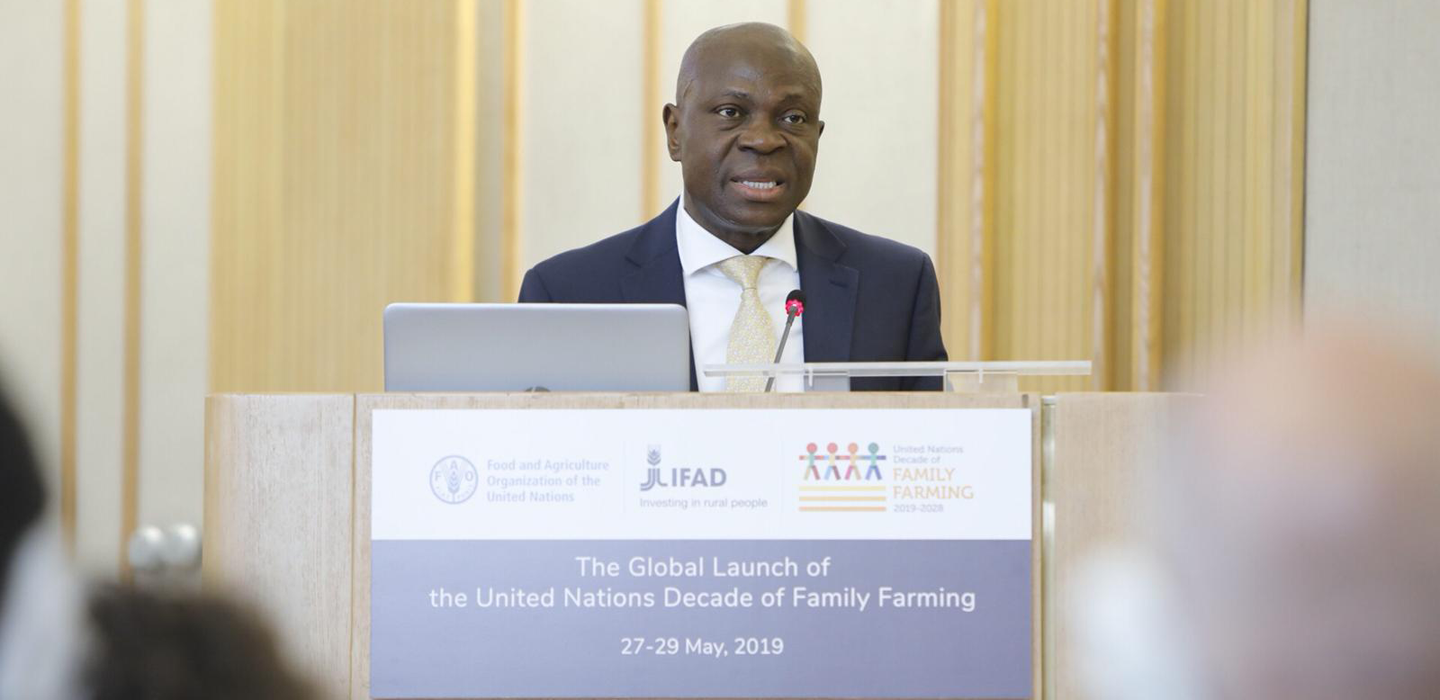Launch of the UN’s Decade of Family Farming to unleash family farmers’ full potential
IFAD Asset Request Portlet
Asset Publisher
Launch of the UN’s Decade of Family Farming to unleash family farmers’ full potential
FAO and IFAD Global Action Plan highlights family farmers as key drivers of sustainable development
29 May 2019
@FAO/Giulio Napolitano
JOINT PRESS RELEASE FAO/IFAD
29 May 2019, Rome - The Food and Agriculture Organization (FAO) and the International Fund for Agricultural Development (IFAD) today launched the United Nations’ Decade of Family Farming and a Global Action Plan to boost support for family farmers, particularly those in developing countries.
The two UN agencies lead the implementation of the Decade of Family Farming declared by the United Nations at the end of 2017.
Family farms represent over 90 per cent of all farms globally, and produce 80 percent of the world’s food in value terms. They are key drivers of sustainable development, including ending hunger and all forms of malnutrition.
The Decade of Family Farming aims to create a conducive environment that strengthens their position, and maximizes their contributions to global food security and nutrition, and a healthy, resilient and sustainable future.
The Global Action Plan provides detailed guidance for the international community on collective and coherent actions that can be taken during 2019-2028.
It highlights the need to increase, among other things, family farmers’ access to social protection systems, finance, markets, training and income-generating opportunities.
“We don’t have only the problem of hunger, which is on this rise, but also the problem of growing obesity. We need to pay attention to obesity. We know what we have to do to combat hunger, but not enough about combating obesity. Family farmers are the ones who produce local, fresh food, and produce food in a sustainable way. This is their contribution,” said José Graziano da Silva, FAO Director-General at the launch of the Decade in Rome.
“To meet the Sustainable Development Goals of zero hunger and no poverty, we must invest in the world’s small-scale family farmers and help them leverage their assets, knowledge and energy, and empower them to transform their lives and communities,” said Gilbert F. Houngbo, IFAD President. “The choices we make now will determine whether our future food systems are healthy, nutritious, inclusive, resilient and sustainable.”
And in letter read out at the launch, Pope Francis said: “The employment of young people in agriculture, in addition to combatting unemployment, can bring new energies to a sector that is proving to be of strategic importance to the national interests of many countries. The goals of the 2030 Agenda cannot ignore the contribution of young people and their capacity for innovation.”
Family farmers are important drivers of sustainable development
Family farming encompasses the production of all food – be that plant-based, meat, including fish, other animal products such as eggs or dairy, and food grown on agricultural lands, in forests, in the mountains, or on fish farms – that is managed and operated by a family, and is predominantly reliant on the family labour of both women and men.
Family farmers provide healthy, diversified and culturally appropriate foods, and grow most of the food in both developing and developed countries.
They generate on- and off-farm employment opportunities, and help rural economies grow.
They preserve and restore biodiversity and ecosystems, and use production methods that can help reduce or avert the risks of climate change.
They ensure the succession of knowledge and tradition from generation to generation, and promote social equity and community well-being.
The Global Action Plan for the Decade of family Farming
Although family farmers produce most of our food they – paradoxically – face poverty, especially in developing countries.
They face challenges because they lack access to resources and services to support their food production and marketing; because their infrastructure is poor; because their voices go unheard in political processes; and because the environmental and climatic conditions on which they rely are under threat.
In general, women farmers face greater constraints. Rural youth are also highly vulnerable due to a lack of incentives for on-and off-farm employment opportunities.
The Global Action Plan of the Decade of Family Farming is a guide to develop policies, programs and regulations to support family farmers, putting forward collective and coherent actions that can be taken during the next ten years.
It details specific activities to address interconnected challenges, and target a range of actors - governments, United Nations agencies, international financial institutions, regional bodies, farmers and producer organizations, academic and research institutes, civil society organizations and the private sector, including small and medium enterprises.
Actions include:
- Developing and implementing an enabling policy environment (including comprehensive and coherent policies, investments and institutional frameworks) that support family farming at local, national and international levels;
- Supporting rural youth and women by enabling them to access productive assets, natural resources, information, education, markets, and participate in policy making processes;
- Strengthening family farmers’ organizations and their capacities to generate knowledge and link locally specific (traditional) knowledge with new solutions;
- Improving family farmers’ livelihoods and enhancing their resilience to multiple hazards though access to basic social and economic services, as well as facilitating and promoting production diversification to reduce risks and increase economic returns;
- Promoting sustainability of family farming for climate-resilient food systems, and their access, responsible management and use of land, water and other natural resources.
- Facts and figures on family farming:
- More than 80 percent of all farms globally are below two hectares.
- Family farms occupy around 70–80 percent of farmland and produce more than 80 percent of the world’s food in value terms.
- Women perform nearly 50 percent of farm labor but hold only 15 percent of farm land.
- 90 percent of fishers are small-scale operators, which account for half of the capture fisheries production in developing countries.
- Up to 500 million pastoralists rely on livestock rearing to make a living.
- Mountain farming is largely family farming.
- Family farmers include forest communities. Around 40 percent of the extreme rural poor live in forest and savannah areas.
- Traditional indigenous territories encompass up to 22 percent of the world’s land surface and coincide with areas that hold 80 percent of the planet’s biodiversity.
IFAD has invested in rural people for 40 years, empowering them to reduce poverty, increase food security, improve nutrition and strengthen resilience. Since 1978, we have provided US$20.9 billion in grants and low-interest loans to projects that have reached about 483 million people. IFAD is an international financial institution and a specialized United Nations agency based in Rome – the UN’s food and agriculture hub.
Press release No.: IFAD/26/2019
